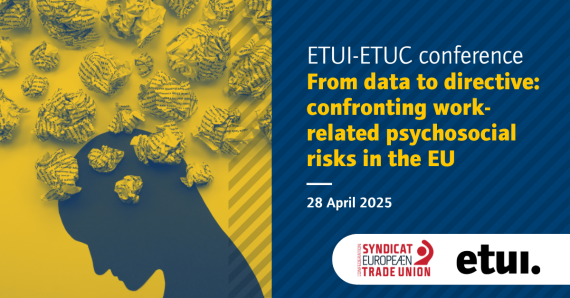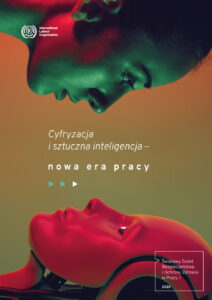
This event will feature progressive cultural artists, workers, youth, and long-standing groups shaping the art of liberation.

This event will feature progressive cultural artists, workers, youth, and long-standing groups shaping the art of liberation.
From Data to Directive: Confronting Work-Related Psychosocial Risks in the EU.
28 April 2025, 09:00 – 16:00 CET
Venue: Hotel DoubleTree by HIlton, Rue Gineste 3, 1210 Brussels, Belgium, meeting room: Pagoda
On International Workers’ Memorial Day, we remember the countless workers who have lost their lives due to workplace accidents and occupational diseases. This day is not only about remembrance—it is about action. While significant progress has been made in reducing physical workplace hazards, psychosocial risks—such as work-related stress, burnout, harassment, and job insecurity—remain among the most prevalent and least regulated occupational hazards in Europe. These risks undermine both workers’ health and workplace productivity, and their prevention must become a priority.
This event will bring together experts, policymakers, and trade union representatives to shed light on the latest data on work-related psychosocial risks, their economic and social costs, and the pressing need for stronger regulatory action at the EU level. We will also launch several new ETUI publications, providing in-depth insights into the current landscape of psychosocial risks and the necessary steps to prevent and eliminate these hazards from European workplaces.
Following the publications launch, a high-level roundtable discussion will engage key stakeholders—from trade unions, policymakers, and researchers—to debate the next steps towards a robust EU directive on psychosocial risks. This discussion will be a critical opportunity to shape the future of occupational health and safety, ensuring that mental well-being is given the same priority as physical safety in the workplace.
Join us in driving the change! Let’s turn research into action and make work safer for everyone—because no one should suffer, fall ill, or lose their life because of their job.
Save the date and be part of this pivotal conversation!
Download HERE the draft programme.
To register please click HERE.
 The widow of Paul Gray, a Bradford stonemason who died of silicosis aged 57, is urging greater worker protections after lawyers secured a settlement over his exposure to deadly silica dust. Paul was never given protective gear during his 20-year career. Legal firm Irwin Mitchell has seen rising numbers added to its Silica Exposure Register and is calling for action ahead of Workers’ Memorial Day, warning silica risks may rival asbestos in future.
The widow of Paul Gray, a Bradford stonemason who died of silicosis aged 57, is urging greater worker protections after lawyers secured a settlement over his exposure to deadly silica dust. Paul was never given protective gear during his 20-year career. Legal firm Irwin Mitchell has seen rising numbers added to its Silica Exposure Register and is calling for action ahead of Workers’ Memorial Day, warning silica risks may rival asbestos in future.
Hazards magazine silica webpages

International Workers’ Memorial Day 2025
International Workers’ Memorial Day (IWMD) is the day that the trade union movement unites to remember workers at home and across the globe who have paid the ultimate price, those who left for work and never returned.
International Workers’ Memorial Day is on Monday 28th April 2025.
Memorial events will take place across Scotland to commemorate those who lost their lives at work:
Friday 25th April:
Bathgate (11:00am): Workers Memorial, Bathgate Sports Centre, Torpichen Road
Coatbridge (12 noon): Summerlee Industrial Museum, Heritage Way, Coatbridge
Glasgow (12 noon): Workers Memorial, People’s Palace / Winter Gardens, Glasgow Green
Saturday 26th April:
Alexandria (1:00pm): Memorial Tree, Christie Park
Aberdeen (12:30pm): Workers’ Memorial, Persley Walled Garden, Bridge of Don, Aberdeen
Edinburgh (12:30pm): Memorial and Tree, West Princes Street Gardens
Falkirk (11:00am): Bandstand, Callendar Riggs, Falkirk
Kirkcaldy (11:00am): Memorial Tree, Beveridge Park
Paisley (12 noon): Workers Memorial, Renfrewshire House, Cotton Street
Renfrew (11:00am): Workers Memorial Cairn, Robertson Park, Paisley Road
Sunday 27th April:
Kilmarnock (11:00am): Memorial Tree, Dean Country Park
Monday 28th April:
Forfar (11:00am): Forfar Community Campus, Kirriemuir Road, Forfar
Dundee (12 noon): City Square, Dundee
Inverness (12:30pm): Workers Memorial, Friars Shott, Huntly Street
Bishopbriggs (1:00pm): Cadders Pit Memorial Cairn, Bishopbriggs Library & Community Hub
Visit the STUC website to keep up to date with events around the country

From data to directive: confronting work-related psychosocial risks in the EU – ETUI-ETUC conference
28 April 2025, DoubleTree by Hilton, (Rue Gineste 3, 1210 Brussels), room Pagoda
On International Workers’ Memorial Day, we remember the countless workers who have lost their lives due to workplace accidents and occupational diseases. This day is not only about remembrance—it is about action. While significant progress has been made in reducing physical workplace hazards, psychosocial risks—such as work-related stress, burnout, harassment, and job insecurity—remain among the most prevalent and least regulated occupational hazards in Europe. These risks undermine both workers’ health and workplace productivity, and their prevention must become a priority.
This event will bring together experts, policymakers, and trade union representatives to shed light on the latest data on work-related psychosocial risks, their economic and social costs, and the pressing need for stronger regulatory action at the EU level. We will also launch several new ETUI publications, providing in-depth insights into the current landscape of psychosocial risks and the necessary steps to prevent and eliminate these hazards from European workplaces.
Following the publications launch, a high-level roundtable discussion will engage key stakeholders—from trade unions, policymakers, and researchers—to debate the next steps towards a robust EU directive on psychosocial risks. This discussion will be a critical opportunity to shape the future of occupational health and safety, ensuring that mental well-being is given the same priority as physical safety in the workplace.
Join us in driving the change! Let’s turn research into action and make work safer for everyone—because no one should suffer, fall ill, or lose their life because of their job.
Save the date and be part of this pivotal conversation!
Download HERE the draft programme.
To register please click HERE.
AFL-CIO has published its Workers, Memorial Day toolkit
This year’s theme is in the USA is “Fight for Our Lives: Safe Jobs Now!” On our website, you can:
Each year, on April 28, we observe Workers’ Memorial Day. On this day, the labor movement remembers workers killed or injured on the job and vows to continue the fight for strong safety and health protections in the workplace. Without workers standing together and fighting for our safety, we would not enjoy the protections from the Occupational Safety and Health Administration (OSHA) and our union contract.
This Workers’ Memorial Day, we are calling on our members to take part in collective action to make sure our workplaces are clean, safe, and healthy! On April 28, fill out and file a PS Form 1767 – Report of Hazard, Unsafe Condition or Practice. Whether something small like sticky floors, or a persistent problem such as a toxic workplace, stand up with your co-workers to shine a light on the hazards in your workplace. If we don’t look out for each other, no one else will.
How a PS Form 1767 Works:
The immediate supervisor must promptly (within the tour of duty): Investigate the alleged condition; Initiate immediate corrective action; Record actions or recommendations on the PS Form 1767; Forward the original PS Form 1767 and one copy to the next appropriate level of management (approving official); Give the employee a copy signed by the supervisor as a receipt; Immediately forward the third copy to the facility safety coordinator. If the hazard is not fixed within 7 days, you can file a grievance to ensure action is taken.
 On 28 April, Poland observes the World Day for Safety and Health at Work. This year’s theme is: Digitalisation and artificial intelligence – a new era of work
On 28 April, Poland observes the World Day for Safety and Health at Work. This year’s theme is: Digitalisation and artificial intelligence – a new era of work
Modern technologies are transforming our workplaces — influencing work organisation, productivity, and also the safety and health of workers. This year, at the initiative of the International Labour Organization, we are looking into the role of artificial intelligence, machine learning, exoskeletons, the Internet of Things, virtual and augmented reality, as well as the challenges associated with remote work and digital platforms.
How can we leverage innovation to improve safety while minimising risks? What changes lie ahead in the coming years? We will seek answers to these questions during the observance, with more details available at:
28 kwietnia obchodzimy w Polsce Światowy Dzień Bezpieczeństwa i Ochrony Zdrowia w Pracy. Tegoroczne hasło brzmi:
Cyfryzacja i sztuczna inteligencja – nowa era pracy
Nowoczesne technologie zmieniają nasze miejsca pracy – wpływają na organizację pracy, wydajność, ale także na bezpieczeństwo i zdrowie pracowników. W tym roku, z inicjatywy Międzynarodowej Organizacji Pracy, przyglądamy się roli sztucznej inteligencji, uczenia maszynowego, egzoszkieletów, Internetu rzeczy, wirtualnej i rozszerzonej rzeczywistości, a także wyzwaniom związanym z pracą zdalną i platformami cyfrowymi.
Jak wykorzystać innowacje, by poprawić bezpieczeństwo i jednocześnie minimalizować ryzyko? Jakie zmiany czekają nas w najbliższych latach? Odpowiedzi na te pytania poszukamy podczas obchodów, których szczegóły można znaleźć na stronie:
Millions of people worldwide now depend on digital platforms for their income. From food delivery couriers to ride hailing drivers and content moderators, technological innovation has opened new opportunities for workers and consumers. However, it has also created a system where workers are often denied their basic rights and protections.
Why this campaign, now?
Under international law, every worker is entitled to decent working conditions and fundamental rights. Yet platform workers often face:
Job security is minimal, with workers at risk of being “logged out” or “deactivated.” Over the past two decades, platform companies have reshaped industries while using business models that circumvent labour laws:
Big platform companies are making massive profits while shifting all the risks onto workers. They operate in a legal grey zone, avoiding employer responsibilities and lobbying against regulations that would ensure fair conditions. This “race to the bottom” threatens not only platform workers but the entire workforce as technology expands further into new sectors.
Download the campaign toolkit and social media material